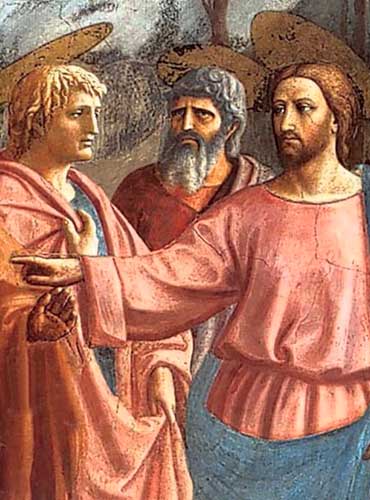Thursday of the Sixth Week of Ordinary Time – Mk 8:27-33
In today’s Gospel Jesus and His disciples head out for “the villages of Caesarea Philippi.” Along the way, Jesus takes a quick survey of popular opinions, and then asks the question: “But who do you say that I am?” This sparks Peter’s confession, an injunction to tell no one, and then the first announcement of His Passion.
Both times that Jesus “asks” His disciples questions, namely, “Who do people say that I am?” and “But who do you say that I am?,” Mark puts the “asks” in the imperfect tense, meaning “the action happened continually or repeatedly.” Along the way, Jesus kept asking those two questions to His disciples, time and time again, until finally Peter gives his confession of faith.
The physical backdrop for the confession is also interesting. Historians tell us that the villages of Caesarea Philippi had a long and storied religious history. It had been a center for the worship of Baal, there was a cave where the Greek god Pan had been born, and Phillip the Tetrarch, whose territory it was, had built a huge temple in honor of the god Caesar.[1] In other words, the villages had always worshipped something, but they missed the target. In the midst of all these false gods, Peter came to identify the one, true God who was walking in their midst.
Even after Peter gives the “right answer,” he clearly doesn’t understand all the implications of it. Steeped in the Jewish understanding of what the Messiah would be like, he rebukes Christ for “speaking openly” about His suffering and death, which earns a rebuke, in turn, from Christ.
In a sense we could say that this passage parallels our religious life. Against the midst of the backdrop of the world, which proposes its false gods to us, and tells us what it thinks Jesus should be like, we’ve found “the Christ,” the real, true, living Son of God. However, simply “finding” Christ, or just knowing who Christ is, isn’t sufficient. As Pope Emeritus Benedict XVI said, “Only in [a] personal relationship with Christ, do we truly become Christians.”[2] It’s not enough simply to know who Christ is; we must know Him, and know Him personally. From this follows love, and also suffering, as Christ “spoke openly.” As Saint Gemma Galgani reminds us, “If you really want to love Jesus, first learn to suffer, because suffering teaches you to love.” “If you really want to love Jesus, first learn to suffer, because suffering teaches you to love.”
Today, we can ask ourselves the question that Christ repeatedly asked His disciples: “Who do you say that I am?” Who is Jesus Christ for us? Do we take the time to know Him in prayer, in adoration, to see Him in our brothers and sisters, to see Him in the midst of suffering?
Through the intercession of Mary, Seat of Wisdom, let us ask for the grace to really come to know Jesus Christ and by knowing Him, to love Him all the more.
[1] Cf. William Barclay’s Daily Study Bible
[2] General Audience, September 3rd, 2008.






